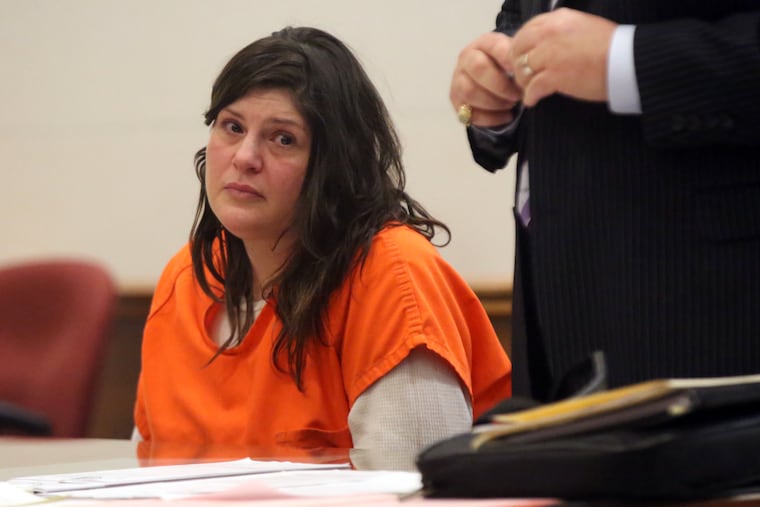Heather Barbera will spend decades in prison in the beating deaths of her mother and grandmother in their Ventnor boardwalk condo
Heather Barbera will decades behind bars in the slayings of her mother and grandmother in their Ventnor boardwalk condo.

MAYS LANDING, N.J. — Heather Barbera was sentenced to 42 years in prison Thursday for bludgeoning her mother and grandmother to death with a nightstick in their Ventnor boardwalk condominium in July 2018, then fleeing to New York with stolen cash and credit cards.
Barbera, 43, apologized in a soft, muffled voice before Atlantic County Superior Court Judge Bernard DeLury handed down the sentence. He said that she had been “exceedingly violent” and that her “depravity” was “palpable.”
Word of her fate came three months after Barbera tearfully pleaded guilty to murder in the death of her grandmother, Elaine Rosen, and aggravated manslaughter in the death of her mother, Michelle Gordon.
Barbera, an unemployed mother of two, had been living with the two women in their eighth-floor condominium in the Vassar Square seaside high-rise when an argument turned physical and she attacked them.
The sentence, part of a negotiated plea agreement between the county prosecutor’s office and defense attorney James J. Leonard Jr., was roundly rejected by Richard Rosen, the brother and son of the victims, and Barbera’s uncle.
“It’s horrible,” Rosen, 52, of Brooklyn, said after leaving the courthouse. “How can you get 42 years for two murders? It should have been life. I don’t understand the judicial system.”
In court, prosecutor Allison Eiselen described in chilling detail how Barbera ended the lives of her relatives.
“This defendant bludgeoned the two victims to death in their own home, then cleaned herself off. She stole their money and jewelry, and as they were gasping their final breaths, she just walked away,” she said. “There is no more heinous, cruel, or depraved crime than killing one’s own mother and grandmother.”
Leonard told the judge Barbera was the victim of a dysfunctional family scarred by drug abuse and mental illness. “I think this was a very, very toxic and unhealthy family dynamic,” he said.
“There were a lot of very, very unfortunate things that took place in Ms. Barbera’s life, particularly with her mother,” Leonard added, without providing details. “There were a lot of competing issues that created a very volatile situation that exploded very unfortunately on that day.”
Judge DeLury, reading from a prepared statement, acknowledged that the sentence might not be acceptable to all. “This is a place of imperfect justice. Nothing this court does can restore the deceased to their loved ones,” he said. “The only thing this court can do is address the facts and circumstances and follow the law.”
He said Barbera received the mandatory minimum 30-year sentence for murder in the slaying of her grandmother and a 12-year sentence for aggravated manslaughter in the death of her mother as part of her plea agreement. The sentences will be served consecutively, he said, meaning she must serve 40 years before she can be considered for parole.
Barbera told police she struck her mother with a flashlight, then grabbed a nightstick that had belonged to her deceased father, a former New York City police officer, and repeatedly beat her over the head. When her grandmother tried to intervene, Barbera beat her to death.
After stealing cash and credit cards from her mother, she fled to New York City. Purchases made on the credit cards led police to track Barbera to the Port Authority Bus Terminal in midtown Manhattan, where she was arrested three days later.
The women’s bloodied bodies were discovered by Barbera’s uncle, Rosen, who drove from New York to the Shore when he could not reach his sister by telephone.
Rosen told police Barbera was emotionally troubled and addicted to drugs. He said he had warned his sister not to let his niece move in with her, but he said his sister was determined to help her daughter set her life on a better path.
The elder Rosen, 87, was a Philadelphia native who moved to New York in the 1950s and married a wedding musician. Barbera’s mother, Gordon, 67, was a patient-care technician.
Barbera’s husband, Jimmy Scott Thompson, 48, who drove 1,200 miles from his home in Brandon, Miss., to attend the hearing, stood stoically outside the courtroom with an armful of legal documents. He said he was displeased with the sentence and planned to get a new lawyer for his wife to file an appeal.
Thompson said he believed the killings were committed in the heat of passion, and thus, he said, Barbera should have been convicted of two counts of manslaughter and sentenced to no more than 20 years. “She’s wrong for what happened, but the charges need to be correct,” said Thompson, an Army veteran who retired as a police officer after 23 years.
He said his wife’s mental health started to deteriorate after her brother died of a drug overdose in April 2018. Two months later, after a disagreement, he said, she left the couple’s home in Mississippi and moved to New Jersey to live with her mother and grandmother. He added that Barbera’s legal name is Thompson and brought their marriage license to confirm that.
“I don’t know what I’m going to do, but I’m going to fight for her,” he said. “I’m her husband.”